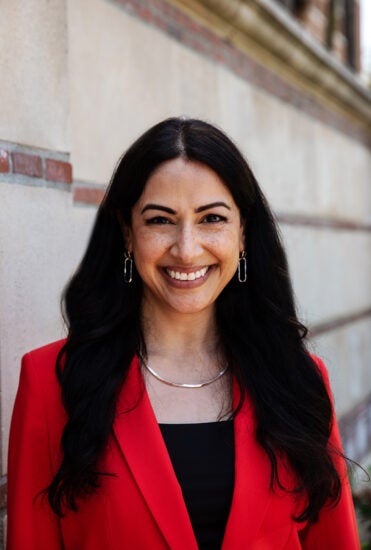
USC Dornsife sociologist Hajar Yazdiha awarded prestigious 2024 Carnegie Fellowship
Hajar Yazdiha, assistant professor of sociology at the USC Dornsife College of Letters, Arts and Sciences, has been named a 2024 Andrew Carnegie Fellow, one of just 28 scholars, authors, journalists and public intellectuals in the United States to receive the honor this year.

Awarded by the Carnegie Corporation of New York, the prestigious fellowship provides substantial support, including a $200,000 grant, to advance recipients’ work. Yazdiha emerged successfully from an intensive evaluation process involving hundreds of candidates to earn the fellowship.
She said the fellowship provides a unique opportunity for scholars to conduct meaningful research and build connections across various disciplines. “The Carnegie is invaluable for the time, resources and community it offers to build out thoughtful, impactful research and to connect with scholars similarly committed to tackling big, unwieldy questions.”
Her initial reaction to receiving the fellowship was one of “utter shock, followed by immense gratitude and excitement.”
She said the focus of this year’s cohort on exploring societal challenges, particularly the issue of polarization and ways to lessen it, opened important pathways for the group to reach solutions. “This is a real opportunity for us to make a collective impact.”
She plans to use the first year of her fellowship to conduct fieldwork in various communities, examining how they confront and reckon with their local histories. The aim is to understand how community-led efforts to acknowledge and address local historical events that may have been contentious or traumatic, can help bring communities together and, where appropriate, heal old wounds.
“My hope is that there are some takeaways that can help us think more broadly about the importance of truth-telling around the past, not as a source of shame or punishment, but rather as a source of collective healing, power and imagination,” she said.
Yazdiha says her scholarly pursuits stem from her background as the daughter of political refugees, which deeply influenced her focus on identity, belonging and the forces shaping societal cohesion and separation.
Her previous work, including her book The Struggle for the People’s King (Princeton University Press, 2023), explored how historical memories of the Civil Rights Movement influence present-day politics and emphasized the potential of confronting history as a means of reconciliation.
“I see questions of social solidarity as some of the building blocks of humanity, and our everchanging world keeps me on my toes as new challenges and questions arise,” she said. “Having two young kids and imagining their futures makes these questions feel all the more urgent.”
Yazdiha earned a PhD in sociology from the University of North Carolina at Chapel Hill in 2017 before joining USC Dornsife later that year. Her work has garnered a spectrum of recognition, including the Canadian Institute for Advanced Research Global Scholars Fellowship, Ford Foundation Postdoctoral Fellowship, and several USC honors, including a 2023 Communicator of the Year Award from USC Dornsife.